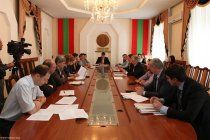 Русский
Русский English
English-







The Right of Choice
Комитет по развитию предпринимательства и промышленности
The issue of expediency of the ban on the importation of cars older than 10 years ago, more than a year was raised and during that time had not only become a stumbling block, but also get the status of a byword. "Obstruction" law-in-draft was adopted in 2008. It was assumed that its implementation will be gradual. But the transition period was long, and there are objective reasons for this: the socio-economic situation in the country was not improved, on the contrary, coming down. If the first extension was legalized and implemented, the extension of the re-licensing rules (before the end of 2015) did not happen. The relevant law, adopted by the Supreme Council in December 2014, is not signed by the President (even after overcoming a veto by Parliament). Lawmakers appealed to the president to sign a "hovering" socially important document, but their arguments were not heeded. As a result, it was decided to petition the Constitutional Court (failure to sign the adopted law violates the Constitution). But the question of the admissibility of import of used cars, however, remains open. In the course of many discussions on this matter the parliamentarians have come to the conclusion that the way out of this situation would be to increase the customs duty on import from abroad four-wheel-retirees. The Supreme Council received two deputy initiatives involving the use of tariff graduation - the older the car, the more expensive cost of its imports. Oleg Vasilaty proposed to divide imported "overgrown" machines to Pridnestrovie into two groups, setting different rates of customs duty for cars aged between 10 and 14 years and their older counterparts that were released on the road more than 14 years ago. Gregory Dyachenko, in turn, considered it proper to tax with high rates of all foreign cars over 10 years old crossing the border in the direction of PMR.
The right to choose - this is the first aspect. The second point to which legislators pay attention to - the benefit of the state, whose budget in the event of any of the initiatives submitted will be updated. After discussing both legislation, deputies Committee on Small, Medium Business and Industry expressed a preference for a document developed by Gregory Dyachenko. It will be recommended to the plenary for adoption in two readings.




